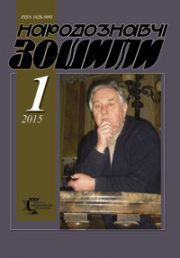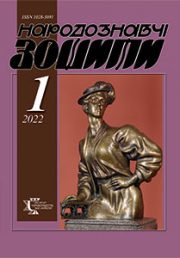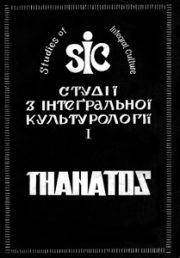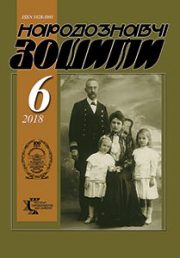The Ethnology Notebooks. 2021. № 4 (160), 893—899
UDK930.2:37.01(477.81-2)”18/19″
DOI https://doi.org/10.15407/nz2021.04.893
HODOVANSKA Oksana
- ORCID ID: https://orcid.org/0000-0002-8297-2414
- Candidate of Historical Sciences,
- Senior Research Fellow
- Department of social anthropology Institute of Ethnology
- of the National Academy of Sciences of Ukraine,
- Ukraine, Lviv, 79000, Svobody Avenue 15;
- Department of the History of Ukraine,
- Museum Studies and Cultural Heritage,
- Lviv Polytechnic National University,
- Ukraine, Lviv, 79013, Bandera street 12,
- Contacts: e-mail: oksana.m.hodovanska@lpnu.ua
KARAGEZOVA Sophia
- ORCID ID: https://orcid.org/0000-0003-3049-8850
- Student, third year of study,
- Department of the History of Ukraine,
- Museum Studies and Cultural Heritage,
- Lviv Polytechnic National University,
- Ukraine, Lviv, 79013, Bandera street, 12,
- Contacts: e-mail: sofiia.karahezova.sm.2019@lpnu.ua
Abstract. The Sarny region united the ancient distinctive cultures of Ukrainians, Belarusians, Poles, Jews, Russians, Germans and other nations, and from the ethnographic point of view formed a special local culture of Polishchuks. Together with the surrounding villages and settlements that were part of Sarny district at the end of the XIX century — early twentieth century the city endured the historical failures of that era. The purpose of the proposed article is to clarify the educational process in the Sarny region in the context of the historical and cultural heritage of this territory. The following tasks were set — to find out the reasons and features of the formation of the main educational institutions of the city and the region as well and to explain their significance in the context of the historical and cultural heritage of the Sarny region. The main sources for writing the article are published archival documents, local folklore, literature and publications in local periodicals. The object of the article is various educational institutions that were opened in the city and county in the late XIX- at the beginning of the XX century. The subject of study is educational changes that took place in the region at that period of time. The main conclusions of the article are that the educational process in the Sarny region played an important role in the context of the historical and cultural heritage of the region. Foremost, it is the «evidence» that from another perspective testifies to our common multinational cultural heritage. Also, the development of school education in the Russian Empire demonstrates the colonial principle in relation to Ukrainians as numerical ethnic group of the region. The modernization processes that affected the city and the county, not only affected the local educational process, but enriched the cultural heritage of the region.
Keywords: school education, multinational, cultural heritage, colonial principle.
Received 30.07.2021
REFERENCES
- Bovsunivska, N.M. (2014). Music education of the Czech and German populations of the Volyn province (XVIII—ХІХ cen.). Visnyk of Zhytomyr State University named after Ivan Franko (Vol. 6, pp. 82—87) [in Ukrainian].
- Buravsky, O.A. (2004). Poles of Volyn in the second half of the XIX — early XX centuries. Zhytomyr: ZhDU [in Ukrainian].
- Ershova, L.M. (2006). Development of women’s education in Volyn (late XVIII — early XX century). Zhytomyr: Polissya [in Ukrainian].
- Ivashchenko, O.V. (1998). Jews of Volyn: late ХVІІ — early XX centuries. Zhytomyr: Volyn [in Ukrainian].
- Rudnytska, N. (2001). Vocational education of Jews in Volyn in the XIX — early XX centuries. Ukrainian Historical Journal, 6, 123—132 [in Ukrainian].
- Kostrytsia, M.Yu. (2001). Society of Researchers of Volyn: history, activity, figures. Zhytomyr: M. A. K. [in Ukrainian].
- Tyshkevych, R.K. (2016). Sarny: historical and local historical essay. Rivne: Diatlyk M.S. [in Ukrainian].
- Sosyuk, V. (2021, 11 mаrch). History of Sarny region in photos. Sarny news, 10, 20 [in Ukrainian].
- Sosiuk, V. (2020, 22 october). History of Sarny region in photos. Sarny news, 42, 24 [in Ukrainian].
- Orlowicz, M. (1929). Ilustrowany przewodnik po Wolyniu. Luck: Nakl. Wolynskiego towarzystwa krajoznawczego i Opieki nad zabytkami przeszlosci [in Polish].
- Marinich, O.M. (1962). Ukrainian Polissya: phys. geogr. essay. Kyiv: Soviet school [in Ukrainian].
- Kopyschyk, A.V. (Ed). (2015). History of the homeland: Sarny region. Rivne: Volyns’ki oberehy [in Ukrainian].
- Myalovytsky, A.V. (Ed). (1973). History of towns and villages of the Ukrainian SSR: Rivne region (Vol. 26). Kyiv: URE AN URSR [in Ukrainian].
- Historical information. Retrieved from: https://sarnyrrada.gov.ua/book/export/html/4572 (Last accessed: 27.07.2021).
- Gureev, I.D. (2010, 27 october). «Our city». The beginning of the railway is the beginning of the chronology of the city of Sarny. The word Sarn: Sarny city magazine (P. 3) [in Ukrainian].
- Stoyan, L. (2017, 22 june). The Jewish community of Sarny in the interwar period. Sarny news, 43, 4 [in Ukrainian].
- Chudel secondary school of I—III degrees. Retrieved from: https://chudelznz.wixsite.com/chudelska-zosh/nasha-istoriya (Last accessed: 23.07.2021).
- Kuzmich, M. (2011, 23 august). 20 years of independence and destiny Tutovych. Sarny news, 60, 87 [in Ukrainian].
- Voitovich, V.M. (2009). My dear Stepan. Research, memories, documents. Rivne [in Ukrainian].
- Zhilinsky, I. (1892). Brief review of Polesye and its sewerage system. St. Petersburg: V. Balashev’s printing house; Ekaterininsky Canal [in Russian].
- Brusnyak, V. (2017, 28 december). Melioration: harm or benefit? Sarny news, 92, 6 [in Ukrainian].







